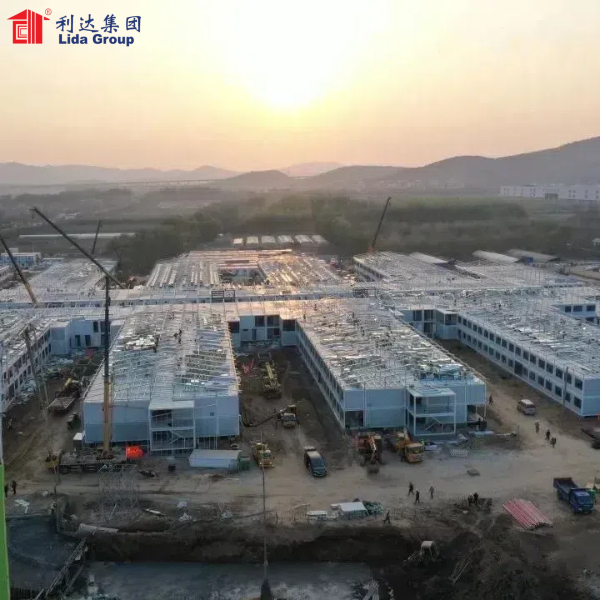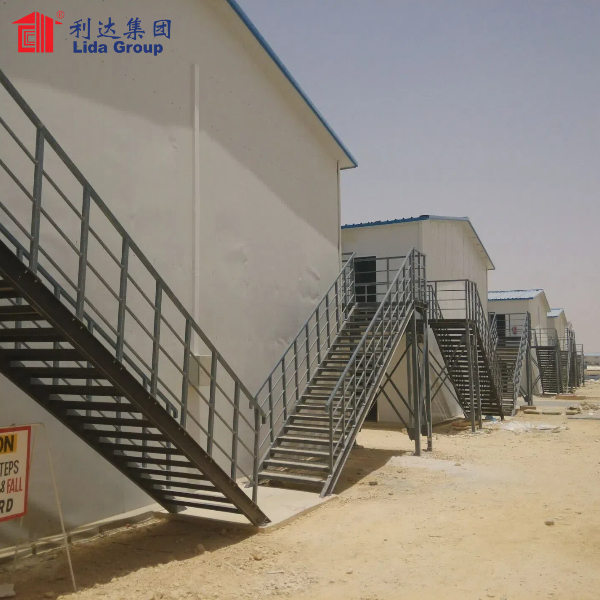Introduction
As industries rapidly expand into remote areas, the importance of providing adequate living conditions for workers has never been more critical. Traditional labor camps, often characterized by basic amenities and poor living conditions, are no longer acceptable in an era that prioritizes sustainability, comfort, and worker well-being. Lida Group has emerged as a leader in this transformation, pioneering sustainable and customized labor camps that meet the evolving needs of the workforce. This article explores Lida Group‘s vision for these innovative labor camps, focusing on sustainability, customization, and the overall impact on worker satisfaction.
The Need for Sustainable Labor Camps
Understanding Labor Camps
Labor camps are temporary or semi-permanent accommodations designed for workers who are deployed in remote locations, such as construction sites, mining operations, and oil fields. Historically, these camps have often been associated with substandard living conditions, which can lead to dissatisfaction and decreased productivity among workers.
The Shift Towards Sustainability
The global push for sustainability has prompted companies to rethink their approach to labor accommodations. Key drivers for this shift include:
- Environmental Concerns: The construction industry is a significant contributor to carbon emissions and waste. Sustainable practices are essential to mitigate these impacts.
- Worker Well-Being: A growing recognition of the importance of mental and physical health in the workplace highlights the need for comfortable living conditions.
- Regulatory Compliance: Increasing regulations regarding worker accommodations necessitate improvements in living conditions and environmental practices.
Lida Group: Company Overview
History and Background
Founded in the early 2000s, Lida Group began as a construction company specializing in prefabricated solutions. Over the years, it has grown into a prominent player in the international market, focusing on customized and sustainable labor camps. The company’s commitment to quality, innovation, and customer satisfaction has propelled its success.
Vision and Mission
Lida Group’s vision encompasses:
- Sustainable Development: Leading the way in sustainable construction practices that minimize environmental impact while maximizing efficiency.
- Customization: Offering tailored solutions that meet the specific needs of various industries and workforces.
- Worker Welfare: Prioritizing the health, safety, and satisfaction of workers through innovative design and thoughtful amenities.
The Core Components of Lida Group’s Sustainable Labor Camps
1. Sustainable Design Principles
Lida Group employs sustainable design principles to create labor camps that are both functional and environmentally friendly. Key aspects include:
- Energy Efficiency: Incorporating energy-efficient systems, such as solar panels and high-quality insulation, reduces energy consumption and costs.
- Sustainable Materials: Utilizing eco-friendly materials sourced responsibly minimizes the environmental footprint of construction.
2. Modular Construction
Modular construction is a hallmark of Lida Group’s approach. This technique involves manufacturing building components off-site and assembling them on location. Benefits include:
- Reduced Waste: Off-site construction minimizes material waste, as excess materials can be reused or recycled.
- Faster Assembly: Modular units can be quickly assembled, reducing the overall construction timeline and associated disruptions.
3. Water and Waste Management
Effective water and waste management systems are essential for sustainable labor camps:
- Water Conservation: Installing low-flow fixtures and greywater recycling systems helps to conserve water resources.
- Waste Reduction: Implementing recycling programs and composting can significantly reduce waste generated by the camp.
4. Climate Resilience
Lida Group designs labor camps to withstand various environmental conditions, ensuring long-term sustainability:
- Durable Materials: Using robust materials that can endure harsh weather conditions contributes to the longevity of the structures.
- Adaptable Designs: Creating flexible designs that can be modified based on changing environmental conditions or workforce needs.
Customization: Meeting Diverse Needs
1. Tailored Living Spaces
One of the standout features of Lida Group’s labor camps is the emphasis on customization. Different sectors have unique requirements that standard housing solutions often fail to meet. Customization allows for:
- Cultural Sensitivity: Designing living spaces that reflect the cultural backgrounds of workers promotes inclusivity and comfort.
- Functional Layouts: Creating layouts that cater to the specific needs of different industries ensures optimal use of space.
2. Comprehensive Amenities
Customized labor camps often include a wide range of amenities designed to enhance the living experience for workers. These may include:
- Kitchens and Dining Areas: Fully equipped kitchens allow workers to prepare their meals, fostering a sense of home and community.
- Recreational Facilities: Access to gyms, lounges, and outdoor spaces encourages relaxation and social interaction among residents.
3. Health and Wellness Facilities
Prioritizing the health and wellness of workers is crucial:
- Medical Services: On-site medical facilities or wellness programs support physical and mental health, contributing to overall satisfaction.
- Mental Health Support: Creating spaces for relaxation and social interaction helps combat feelings of isolation and stress.
The Impact of Sustainable and Customized Labor Camps on Worker Satisfaction
1. Improved Living Conditions
Lida Group’s focus on customization and sustainability leads to significantly improved living conditions for workers. Key benefits include:
- Comfortable Spaces: Well-designed interiors with essential amenities contribute to a more pleasant living experience.
- Privacy: Individual or semi-private living units allow workers to relax and recharge after long workdays.
2. Enhanced Community Building
Customized labor camps foster a sense of community among workers:
- Shared Facilities: Common areas for dining and recreation encourage social interaction and relationship building.
- Organized Activities: Providing spaces for social events and activities enhances camaraderie among residents.
3. Mental Well-Being
A comfortable living environment positively impacts mental health:
- Reduced Stress: Comfortable amenities and private spaces help alleviate stress and promote relaxation.
- Sense of Belonging: A supportive community fosters a sense of belonging, which is vital for mental well-being.
4. Increased Productivity
The benefits of improved living conditions extend to productivity:
- Higher Morale: Satisfied workers are generally more motivated and engaged in their tasks.
- Better Focus: Comfortable living conditions allow workers to rest properly, leading to improved focus and performance on the job.
Case Studies: Lida Group’s Successful Labor Camp Projects
Case Study 1: Construction Site Labor Camp
Background
A major construction company was tasked with building a large infrastructure project in a remote area. The firm needed to accommodate over 200 workers for an extended period.
Implementation
Lida Group provided customized labor camps that included:
- Individual Living Units: Each unit featured a private room with necessary furnishings.
- Common Dining and Recreation Areas: Designed to promote social interaction among workers.
Results
- Improved Worker Satisfaction: Surveys indicated a significant increase in worker satisfaction due to improved living conditions.
- Enhanced Productivity: The construction firm reported higher productivity levels, attributing this to the comfortable living environment.
Case Study 2: Mining Operation Housing
Background
A mining company faced challenges with high turnover rates and low morale among its workforce, which operated in a remote and harsh environment.
Implementation
Customized labor camps were deployed that included:
- Durable Structures: Designed to withstand extreme weather conditions while ensuring worker comfort.
- Community Spaces: Common areas for socialization and activities to foster a sense of belonging.
Results
- Decreased Turnover Rates: The company experienced a significant reduction in turnover as workers appreciated the quality of their living conditions.
- Positive Community Atmosphere: The design fostered strong relationships among workers, enhancing teamwork and collaboration.
Economic Benefits of Lida Group’s Sustainable Labor Camps
1. Cost Efficiency
Investing in sustainable labor camps can lead to substantial cost savings for companies:
- Lower Initial Investment: The use of repurposed materials reduces the overall construction costs.
- Reduced Operational Expenses: Faster setup and lower labor costs contribute to overall savings.
2. Increased Efficiency
Customized labor camps can enhance operational efficiency:
- Quick Deployment: Rapid setup allows companies to focus resources on core activities rather than housing logistics.
- Streamlined Operations: The modular nature of labor camps enables quick adjustments and expansions as needed.
3. Long-Term Benefits
Investing in high-quality living conditions can yield long-term benefits for companies:
- Improved Employee Retention: Satisfied workers are more likely to stay, reducing recruitment and training costs.
- Enhanced Reputation: Companies that prioritize worker welfare often have better reputations, attracting top talent.
Future Trends in Sustainable Labor Camps
1. Technological Innovations
As technology advances, the potential for enhanced labor camp solutions increases:
- Smart Home Features: Integrating IoT devices for improved energy management, security, and convenience.
- Advanced Materials: Utilizing innovative materials that enhance insulation and durability.
2. Expansion into New Markets
The demand for sustainable labor camps is likely to grow in emerging markets, addressing the need for efficient and adaptable housing solutions in various sectors.
3. Continued Focus on Sustainability
The future of labor camps will increasingly emphasize sustainability:
- Eco-Friendly Practices: Continued commitment to reducing environmental impact through responsible sourcing and energy-efficient designs.
- Community-Centric Solutions: Designing housing that fosters community and social interaction among residents.
Conclusion
Lida Group’s vision for sustainable and customized labor camps represents a significant advancement in how worker accommodations are approached. By prioritizing sustainability, customization, and worker well-being, Lida Group is paving the way for a new era of labor camps that meet the demands of modern industries.
As the need for efficient and adaptable housing solutions continues to grow, Lida Group’s commitment to quality and innovation positions it as a leader in shaping the future of labor accommodations. By investing in high-quality living conditions that prioritize worker satisfaction, companies can enhance productivity and foster a positive work environment, ultimately contributing to their long-term success.
Contact Us
Post time: Nov-21-2024


